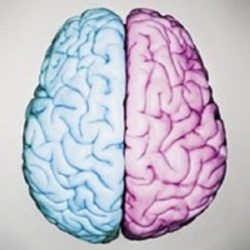The mind-body connection makes us unique in our sexuality and preferences. As a women’s sexual wellness expert, I work with women on a large variety of issues from frequency disparity, pre-menopausal dryness and communication to understanding how antidepressants affect their libido, finding complementary therapies and understanding erectile dysfunction. While most of my time is spent educating and sharing information about how the mind affects the body (after all the brain is our largest sex organ); sometimes it is just as important to step back and let our bodies inspire us intellectually.
Physiologically we are sexual beings. How else can you explain the clitoris? With 8,000 nerve endings, its sole purpose is pleasure. No wonder 70% of women experience orgasm through clitoral stimulation. However, clitoral stimulation involves feeling aroused because it usually doesn’t happen until right before penetration if it is stimulation from a partner. Here lies the problem for so many women. Equal rights, the pill and the sexual revolution came as part of a package that added all kinds of other stress along with the benefits. Unfortunately, for some women the revolution added no real revolutionary thinking when it came to their sexuality.
When I am out sharing the good news about sexual wellness, one of the saddest things I hear from the baby boomer generation is the woman who says “Oh, I don’t need any of THAT. THAT is all out of commission.” My heart goes out to her immediately. In my mind I wonder who could have reduced her to just a reproductive machine, whether she was abused and associates her femininity with the source of the abuse or maybe even that she must tragically still be recovering from the loss of the love of her life. Certainly, it would have to be something so severe as one of these circumstances for someone to believe that sexual health is not important to overall health or to limit their sexuality to only their reproductive capabilities. Sadly, that is not the case. While there are many reasons why a woman may make such a statement; in many cases it is because a woman doesn’t know the benefits of an orgasm or how pelvic floor health can impact other bodily functions. These are important facts that have long been either unknown or not discussed.
The Kissing Connection
As I mentioned earlier while the brain is the largest sex organ in the body; sometimes it doesn’t hurt to not listen to our head and just dive into something that we know works for us physically. While the clitoris has 8,000 nerve endings, the lips (both male and female) have somewhere around 10,000. This makes the lips quite the erogenous zone in their own right and kissing would be the ideal way to stimulate them. I am often singing the praises of products that are made with mint as a means of encouraging blood flow. I usually talk about kissing when I am explaining why we all seem to lose our head during the throws of puberty. All those new and unfamiliar hormones are stirring and then we add the stimulation of lips against lips and lose sight of everything but the physical. I recently saw a video of an ad on social media that captured total strangers kissing for the first time. The ad went viral because so many people were enthralled with the idea that a first kiss can lead to love. Ultimately everything we do is motivated from love or fear and 95% of everything we do is done by the subconscious. So for those who are struggling with their libido or just can’t seem to get there mentally a little oral exercise such as a passionate kiss can be a magic bullet. The thing about kissing is it can start slow and build momentum. So even if you aren’t feeling sexual, the stimulation with your significant other or your partner of choice can start with a little effort and go a long way.
Kissing Stimulates Blood Flow
Blood flow is the key to arousal and lubrication. Kissing stimulates nerve endings which in turn increase blood flow. Once this cycle begins, the body begins a natural responsiveness and triggers emotional responsiveness in the mind. The mind-body connection is a two way street and while the mind may be the dominant force it is important to never underestimate the physical contributions. A question I find myself asking women who are struggling with a lack of desire and determined to save their relationships is “When was the last time you made out on the couch?” and the question is generally followed by a quiet response of something to do with a lack of time or a repeat of their lack of desire. Time is the great equalizer. We all have the same amount each day in our account. I am amazed how there is time for everything else, but not for something as good for us as sex. My next step is to challenge them. The next time they feel insecure about their relationship, because of their lack of desire for sex; their challenge is to “make out” for at least fifteen minutes. I coach them about starting slow and innocent and building until they are out of breath. (Keep in mind I am not a doctor. These conversations come after I know whether this person is on medications under a doctor’s care, or am assured we shouldn’t be looking for medical assistance or if there is a need for a therapist.) Of course after the challenge, I work on helping them understand why this exercise can help them and some of the biological reasons behind it. The challenge itself is met with a wide variety of responses. I hear everything from an insecure laugh to outright refusal. Of course the receptiveness determines the next course of action and everyone is slightly unique in how we proceed; because we are all unique.
Sealed with a Kiss
What is important to remember is emotional fulfillment is one of the three reasons we have sex. Kissing inspires some of those emotions that we are looking to fulfill such as passion, intimacy, sensuality and desire. Kissing also allows us to warm up to the idea and if for some reason after kissing for a while one doesn’t feel sexual arousal there is still the ability to decline further sexual activity. This is very important for women who are struggling with a lack of sexual desire. It is not as easy to change course if you start out initiating sex and then change your mind and decline. Since kissing can stand as an activity all on its own; if it goes no further than an oral exchange there is no harm. From the feedback I receive, it is often successful in leading to more. One of the things I hear from men who are in relationships with women struggling in this area is the negative impact obligatory sex has on their self image. No one wants to feel as if sex is an obligation. Of course communication is key in all relationships; however there is a lot to be said for learning to effectively use body language. When trying to overcome issues with libido, what better way to communicate to your partner than with your lips?
About the author: Patricia Mooneyham is a Jersey girl on global mission to help women be happier. She is a practitioner of complementary therapies and is passionate about helping women find happiness by defining their own sexuality. For the last several years she hosted the I’ll Have What She’s Having Online Radio Show. Her website: PatriciaMooneyham.com.
We Need Your Help
More people than ever are reading Hormones Matter, a testament to the need for independent voices in health and medicine. We are not funded and accept limited advertising. Unlike many health sites, we don’t force you to purchase a subscription. We believe health information should be open to all. If you read Hormones Matter, like it, please help support it. Contribute now.
Yes, I would like to support Hormones Matter.
Photo by zelle duda on Unsplash.















